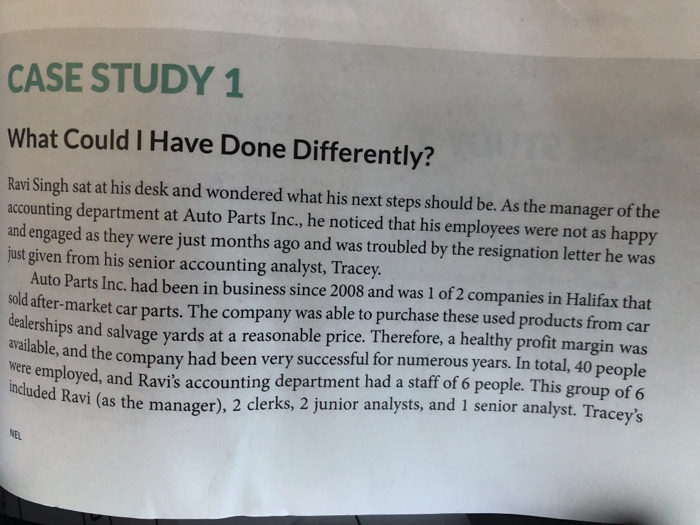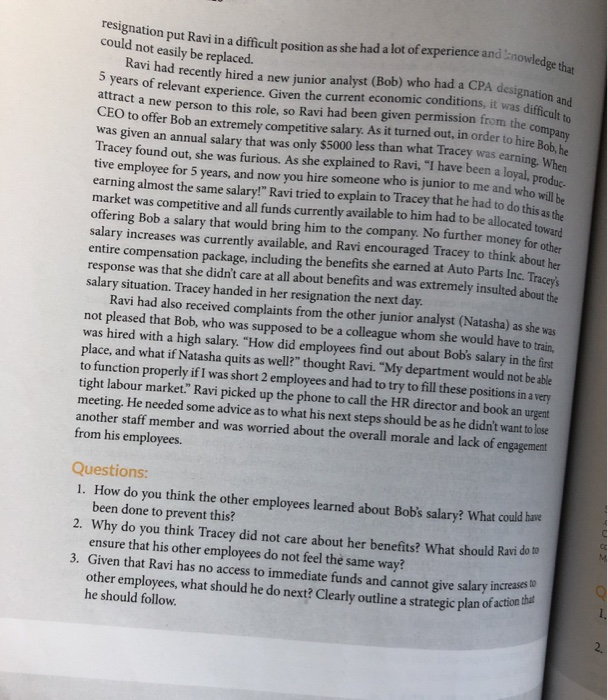included Ravi (as the manager), 2 clerks, 2 junior analysts, and 1 senior analyst. Tracey's CASE STUDY 1 What Could I Have Done Differently? Ravi Singh sat at his desk and wondered what his next steps should be. As the manager of the accounting department at Auto Parts Inc., he noticed that his employees were not as happy and engaged as they were just months ago and was troubled by the resignation letter he was just given from his senior accounting analyst, Tracey. Auto Parts Inc. had been in business since 2008 and was 1 of 2 companies in Halifax that sold after-market car parts. The company was able to purchase these used products from car dealerships and salvage yards at a reasonable price. Therefore, a healthy profit margin was available, and the company had been very successful for numerous years. In total, 40 people were employed, and Ravi's accounting department had a staff of 6 people. This group of 6 NEL CEO to offer Bob an extremely competitive salary. As it turned out, in order to hire Bob, he resignation put Ravi in a difficult position as she had a lot of experience and snowledge that 5 years of relevant experience. Given the current economic conditions, it was difficult to Ravi had recently hired a new junior analyst (Bob) who had a CPA designation and a could not easily be replaced. company attract a new person to this role, so Ravi had been given permission from the was given an annual salary that was only $5000 less than what Tracey was earning. When Tracey found out, she was furious. As she explained to Ravi. "I have been a loyal, produc- tive employee for 5 years, and now you hire someone who is junior to me and who will be earning almost the same salary!" Ravi tried to explain to Tracey that he had to do this as the market was competitive and all funds currently available to him had to be allocated toward offering Bob a salary that would bring him to the company. No further money for other salary increases was currently available, and Ravi encouraged Tracey to think about her entire compensation package, including the benefits she earned at Auto Parts Inc. Tracey's response was that she didn't care at all about benefits and was extremely insulted about the salary situation. Tracey handed in her resignation the next day. Ravi had also received complaints from the other junior analyst (Natasha) as she was not pleased that Bob, who was supposed to be a colleague whom she would have to train, was hired with a high salary. "How did employees find out about Bob's salary in the first place, and what if Natasha quits as well?" thought Ravi. "My department would not be able to function properly if I was short 2 employees and had to try to fill these positions in a very tight labour market." Ravi picked up the phone to call the HR director and book an urgent meeting. He needed some advice as to what his next steps should be as he didn't want to lose another staff member and was worried about the overall morale and lack of engagement from his employees. Questions: 1. How do you think the other employees learned about Bob's salary? What could have been done to prevent this? 2. Why do you think Tracey did not care about her benefits? What should Ravi do to ensure that his other employees do not feel the same way? 3. Given that Ravi has no access to immediate funds and cannot give salary increases other employees, what should he do next? Clearly outline a strategic plan of action tha he should follow








